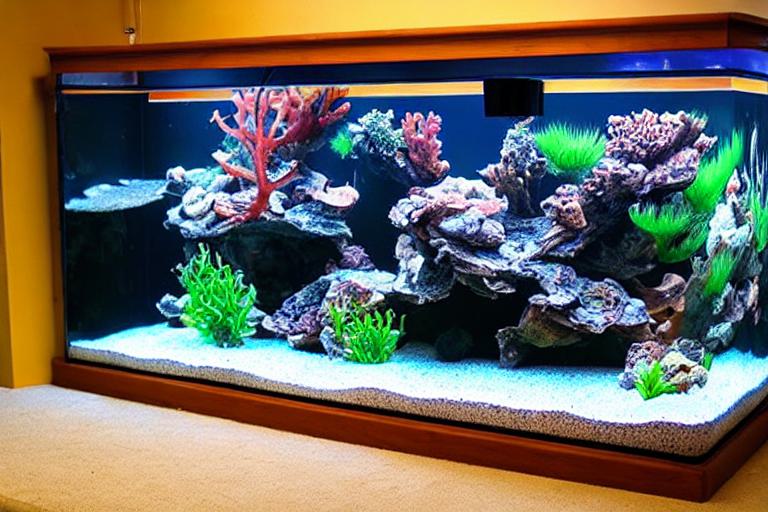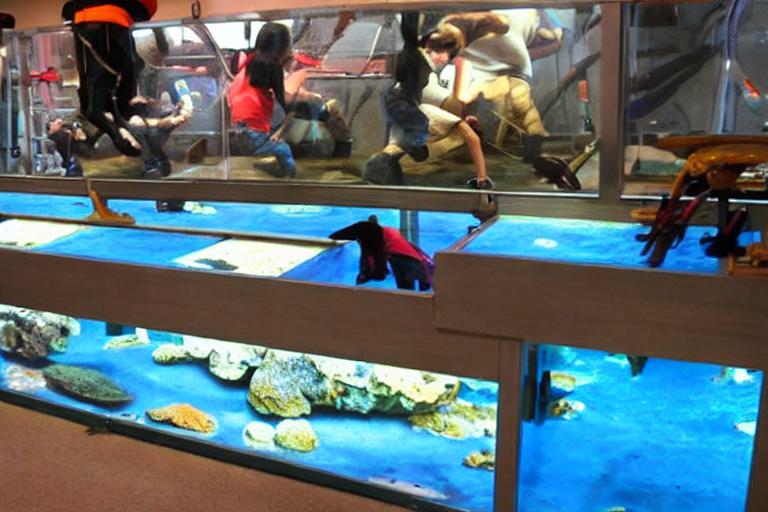Aquariums come in all shapes and sizes. How much an aquarium weighs depends on the size of the aquarium and the material it is made out of. Aquariums can be made out of glass, acrylic, or fiberglass. The weight of the aquarium will also depend on if it is empty or if it has water in it. A full aquarium can weigh 10 to 15 times more than an empty aquarium.
How much does an aquarium weight?
The larger the aquarium, the more weight it will add to the room. An aquarium can weigh anywhere from 10 to 55 pounds, depending on the size and type. It is important to make sure that the floor can support the weight of the aquarium and that the aquarium is placed on a level surface. The weight of an aquarium is important to consider when choosing a location for it.
Do you need a dedicated aquarium stand?
There are many factors to consider when choosing an aquarium stand, including the size and weight of your aquarium and the type of fish you keep. Aquarium stands come in a variety of shapes and sizes, but they all serve the same purpose: to provide support for your aquarium.
The stand should also be sturdy enough to prevent the aquarium from tipping over. However, if you have a large aquarium, you will need a stand that can support the weight of the water and the fish. If you have a small aquarium, you may not need a dedicated stand. A coffee table or end table may be sufficient.
When choosing an aquarium stand, be sure to consider the height of the stand. The stand should be tall enough so that you can easily see into the aquarium, but not so tall that it is difficult to reach the top of the aquarium.
There are many different types of aquarium stands available, so take your time to find one that meets your needs. With a little bit of research, you can find the perfect stand for your aquarium.

Cabinets and aquarium stands
They not only provide a place to put your aquarium, but also help to support the weight of the water and fish inside. Cabinets and aquarium stands are two important pieces of furniture for any fish keeper.
When choosing a cabinet or stand for your aquarium, it is important to consider the weight of the aquarium and the fish inside. A small aquarium may only weigh a few hundred pounds, while a large one can easily weigh over 1,000 pounds.
It is also important to consider the placement of the aquarium. A cabinet or stand that is too close to a wall or other piece of furniture can be unstable and dangerous. The best placement for an aquarium is in the middle of a room where it can be easily seen and enjoyed.
Make sure your floor can hold the weight
When it comes to placing an aquarium in your home, it’s important to make sure your floor can support the weight. The average aquarium weighs around 10 pounds per gallon, so a 20-gallon aquarium would weigh about 200 pounds when full.
You can also talk to a professional to get an estimate of how much weight your floor can hold. If you’re not sure how much weight your floor can support, it’s best to err on the side of caution and go with a smaller aquarium.
Avoid placing it on carpet, as the weight of the aquarium can cause the carpet to bunch up and create an uneven surface. In general, it’s best to place your aquarium on a solid surface like a concrete floor or a table.

Custom aquarium builds
You can choose the size, shape, and style of your aquarium, and even add custom features like built-in filtration and lighting. There are many companies that specialize in custom aquarium builds, and the options are endless. If you have ever dreamed of owning a custom aquarium, now is the time to make that dream a reality.
The cost of a custom aquarium build will vary depending on the size and complexity of the design, but you can expect to pay anywhere from a few hundred to a few thousand dollars. The good news is that custom aquariums are built to last, so you won’t have to worry about replacing it anytime soon.
If you’re ready to take the plunge and get a custom aquarium of your own, contact a reputable builder today to get started.
Correct placement of your aquarium
When it comes to placing your aquarium, there are a few things you need to take into consideration. The last thing to consider is the placement of your aquarium. The second is the size of your aquarium. You need to make sure it will fit in the space you have available. The first is the weight of your aquarium. You need to make sure it is in a location where it will not be in the way or in a place where it could be damaged. A full aquarium can weigh a few hundred pounds, so you need to make sure it is placed on a sturdy surface that can support its weight.
Some popular aquarium dimensions
Aquariums come in all shapes and sizes, but some dimensions are more popular than others.
A standard 10-gallon aquarium is one of the most popular sizes. It’s big enough to house a few fish, but not so big that it’s difficult to care for.
It’s big enough to keep a few different types of fish, but not so big that it’s difficult to care for. This is a good size for a beginner fish keeper. Another popular size is the 20-gallon aquarium.
The 55-gallon aquarium is also a popular size. This is a good size for an intermediate fish keeper. It’s big enough to keep a variety of fish, and it’s easier to maintain than a smaller aquarium.
This size is good for an experienced fish keeper. Finally, the 75-gallon aquarium is the largest size that is commonly available. It’s big enough to keep a large variety of fish, and it’s easy to maintain.
Other things to remember when looking to get an aquarium
The size of the aquarium is important, as is the weight. When looking for an aquarium, there are a few other things to keep in mind. It is also important to consider the placement of the aquarium, as it should be placed in an area that can support its weight.
It is important to choose an aquarium that will be suitable for the type of fish that will be kept in it. Some fish require more space than others, and some are more active than others. Another thing to consider is the type of fish that will be kept in the aquarium.
Some aquariums require more maintenance than others, and it is important to choose an aquarium that is easy to maintain. Finally, it is important to consider the maintenance of the aquarium.
Frequently Asked Questions
1. How much does an aquarium weight?
The weight of an aquarium will vary depending on the size and material. A small, plastic aquarium may weigh around 10 pounds, while a large, glass aquarium can weigh up to 500 pounds.
2. What are the different sizes of aquariums?
Aquariums come in a variety of sizes, from small desktop aquariums that hold around 2 gallons of water, to large floor aquariums that can hold up to 100 gallons of water.
3. What is the best placement for an aquarium?
When choosing a placement for your aquarium, you’ll want to consider factors such as the amount of sunlight the location receives, the weight of the aquarium, and whether you’ll have easy access to a water source.
4. How much water can an aquarium hold?
The size of the aquarium will determine how much water it can hold. A small aquarium may only be able to hold 2 gallons of water, while a large aquarium can hold up to 100 gallons of water.
5. What type of fish can I put in my aquarium?
The type of fish you can put in your aquarium will depend on the size of the aquarium and the type of water you’re using. Freshwater fish can be kept in smaller aquariums, while saltwater fish require a larger aquarium.
Final thoughts
Aquariums come in all shapes and sizes, and with that, all different weights. The weight of your aquarium will depend on the size and material it is made out of. The average weight of a glass aquarium is 10-20 pounds per gallon, while the average weight of a plastic aquarium is 5-10 pounds per gallon. The weight of your aquarium will also affect where you can place it in your home. Make sure to take into account the weight of your aquarium when deciding on a location.
